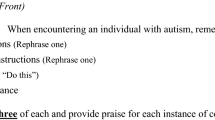Abstract
Highly publicized interactions between law enforcement officers (LEOs) and individuals with autism spectrum disorder (ASD) have raised questions about LEOs’ training related to ASD. In the present study, 157 LEOs participated in ASD-specific training and completed pretest and posttest surveys of autism knowledge, confidence, and self-monitoring. The majority of LEOs responded to calls involving someone with ASD in the last year, with 20% of these calls resulting in involuntary psychiatric hospitalization. LEO knowledge of ASD, self-confidence in responding to calls, and self-monitoring of performance increased from pretest to posttest. Compared to male counterparts, female officers were less likely to use force and handcuffs when responding to ASD-related calls. Female officers’ self-confidence increased significantly more than male officers.
Similar content being viewed by others
References
Baio, J., Wiggins, L., Christensen, D. L., Maenner, M. J., Daniels, J., Warren, Z., et al. (2018). Prevalence of autism spectrum disorder among children aged 8 years—autism and developmental disabilities monitoring network, 11 sites, United States, 2014. MMWR Surveillance Summaries, 67(SS-6), 1–23. https://doi.org/10.15585/mmwr.ss6706a1.
Chown, N. (2009). ‘Do you have any difficulties that I may not be aware of?’ A study of autism awareness and understanding in the UK police service. International Journal of Police Science & Management, 12, 256–273. https://doi.org/10.1350/ijps.2010.12.2.174.
Copenhaver, A., & Tewksbury, R. (2019). Interactions between autistic individuals and law enforcement: A mixed-methods exploratory study. American Journal of Criminal Justice, 44, 309–333.
Crane, L., Maras, K. L., Hawken, T., Mulcahy, S., & Memon, A. (2016). Experiences of autism spectrum disorder and policing in England and Wales: Surveying police and the autism community. Journal of Autism and Developmental Disorders, 46(6), 2028–2041.
Eadens, D. M., Cranston-Gingras, A., Dupoux, E., & Eadens, D. W. (2016). Police officer perspectives on intellectual disability. Policing An International Journal of Police Strategies & Management, 39, 222–235.
Gardner, L., Campbell, J. M., & Westdal, J. (2019). Brief Report: Descriptive analysis of law enforcement officers’ experiences with and knowledge of autism. Journal of Autism and Developmental Disorders, 49(3), 1278–1283.
Garner, J. H., Maxwell, C. D., & Heraux, C. G. (2002). Characteristics associated with the prevalence and severity of force used by the police. Justice Quarterly, 19(4), 705–746.
Hepworth, D. (2017). A critical review of current police training and policy for autism spectrum disorder. Journal of Intellectual Disabilities and Offending Behaviour, 8(4), 212–222.
Laan, J. M., Ingram, R. V., & Glidden, M. D. (2013). Law enforcement training on mental disorder and autism spectrum disorders in the southeastern United States. Journal of Global Intelligence & Policy, 6(10), 51–67.
Leong, N. (2018). In a different force. The George Washington Law Review, 86(6), 1552–1563.
Modell, S. J., & Mak, S. (2008). A preliminary assessment of police officers' knowledge and perceptions of persons with disabilities. Intellectual and Developmental Disabilities, 46(3), 183–189.
Murrie, D. C., Warren, J. I., Kristiansson, M., & Dietz, P. E. (2002). Asperger's syndrome in forensic settings. International Journal of Forensic Mental Health, 1(1), 59–70.
Petersilia, J. R. (2001). Crime victims with developmental disabilities: A review essay. Criminal Justice and Behavior, 28(6), 655–694.
Rabe-Hemp, C. E. (2008). Female officers and the ethic of care: Does officer gender impact police behaviors? Journal of Criminal Justice, 36(5), 426–434.
Schuck, A. M., & Rabe-Hemp, C. (2007). Women police: The use of force by and against female officers. Women & Criminal Justice, 16(4), 91–117.
Teagardin, J., Dixon, D. R., Smith, M. N., & Granpeesheh, D. (2012). Randomized trial of law enforcement training on autism spectrum disorders. Research in Autism Spectrum Disorders, 6, 1113–1118. https://doi.org/10.1016/j.rasd.2012.02.002.
Tint, A., Palucka, A. M., Bradley, E., Weiss, J. A., & Lunsky, Y. (2017). Correlates of police involvement among adolescents and adults with autism spectrum disorder. Journal of Autism and Developmental Disorders, 47, 2639–2647. https://doi.org/10.1007/s10803-017-3182.
Watson, A. C., & Fulambarker, A. J. (2012). The Crisis Intervention Team model of police response to mental health crises: A primer for mental health practitioners. Best Practices in Mental Health, 8(2), 71.
Funding
The training program included within this study is funded by a grant through the Cigna Foundation.
Author information
Authors and Affiliations
Contributions
All authors contributed to the study conception and design. Material preparation, data collection and analysis were performed by Lauren Gardner, PhD and Jonathan Campbell, PhD. The first draft of the manuscript was written by Lauren Gardner, PhD and all authors commented on previous versions of the manuscript. All authors read and approved the final manuscript.
Corresponding author
Ethics declarations
Conflict of interest
The authors declare that they have no conflict of interest.
Informed Consent
Informed consent was obtained from all individual participants included in the study.
Research Involving Human Participants and/or Animals
All procedures performed in studies involving human participants were in accordance with the ethical standards of the institutional and/or national research committee and with the 1964 Helsinki declaration and its later amendments or comparable ethical standards.
Additional information
Publisher's Note
Springer Nature remains neutral with regard to jurisdictional claims in published maps and institutional affiliations.
Rights and permissions
About this article
Cite this article
Gardner, L., Campbell, J.M. Law Enforcement Officers’ Preparation for Calls Involving Autism: Prior Experiences and Response to Training. J Autism Dev Disord 50, 4221–4229 (2020). https://doi.org/10.1007/s10803-020-04485-5
Published:
Issue Date:
DOI: https://doi.org/10.1007/s10803-020-04485-5




